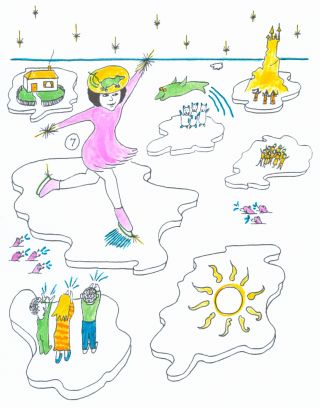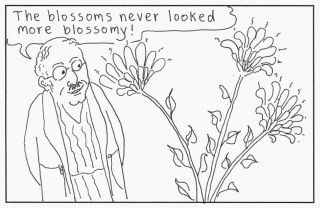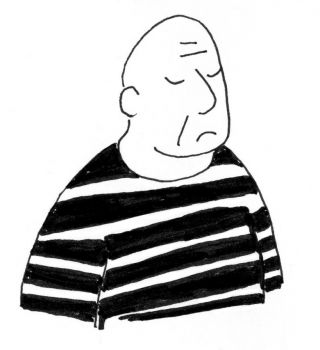
Anxiety
Nostalgia—a Valuable Tool for Life
Focusing on what our lives have meant to us reassures us we’re valuable.
Posted July 16, 2013

"Thinking of good times." Drawing from Enneagram of Parenting
What memories from the past bring you happiness and a feeling of being connected? For me it is a song from my childhood, “Zippity Doo Dah,” for example, or anything by the Andrews Sisters. The Brahms, Bartok, and Bach my husband and I first listened to together also qualify. Or something my kids liked, such as a Pete Seeger or Burl Ives kids’ record. Memories of big events also make me feel connected in a good way, like the day World War II ended and paper boys ran through the streets broadcasting the headlines.
Dozens of researchers around the world have been studying nostalgia. Their tests show it usually evokes a positive emotion. Nostalgia was considered a disorder, however, ever since a 17th century Swiss physician attributed soldiers’ mental and physical maladies to longing to return home: nostos in Greek. Algos means pain.
Constantine Sedikides, who has been studying nostalgia since 1999, has devised a questionnaire called the Southampton Nostalgia Scale. He says, “Nostalgia makes us a bit more human. It made me feel my life had roots and continuity. It made me feel good about myself and my relationships. It provided a texture to my life and gave me strength to move forward. It’s not homesickness. It’s not just for those away from home. It’s not a sickness, despite its historical reputation.”
In “Fond Remembrances” in the Science Times of 7-9-13, John Tierney says, “Nostalgia has been shown to counteract loneliness, boredom, and anxiety. It makes people more generous to strangers and more tolerant of outsiders. Couples feel closer and look happier when they’re sharing nostalgic memories. On cold days, or in cold rooms, people use nostalgia to literally feel warmer.
Researchers in the Netherlands found that listening to songs made people feel warmer physically. Psychologists conducted a series of experiments with English, Dutch and American adults where they induced nostalgia by playing hit songs from the past and letting them read lyrics from their favorite songs. These people were more likely than a control group to say they felt loved and “life is worth living.” The head of the study, Dr. Rutledge, said, “Nostalgia serves a crucial existential function. It brings to mind cherished experiences that assure us we are valued people who have meaningful lives. Some of our research shows that people who regularly engage in nostalgia are better at coping with concerns about death.”

“I had a meaningful life and now my days are happy.”
Dr. Sedikides draws on his nostalgic repository when he needs a psychological lift or some extra motivation. He focuses on the memories and savors them without comparing them with anything else. Comparison-free nostalgizing is taught to first-year college students as part of a study testing its value for people in difficult situations. They benefit from focusing on what their life has meant. This technique can also be used for people in nursing homes, women recovering from cancer surgery, and prison inmates.

“It would be worse without my memories.”
People with avoidant personalities, who are leery of intimate relationships, don’t benefit from regular nostalgia as much as people who crave closeness. 2-Helpers and 4-Romantics, feeling types in the Enneagram, are most likely to profit. 5-Observers who are avoidant are least likely to profit.
Indulging in nostalgia is different from reminiscing and can counteract loneliness, boredom, and anxiety and inspire optimism. Dr. Sedikides says experience is a prized possession that no one can take away. “It’s our diamond.”
Visit http://wagele.com to check out my books, CD, cartoons, and essays, and Famous Enneagram Types.
Read my blog on How to Prepare for a Job Interview on WordPress.

